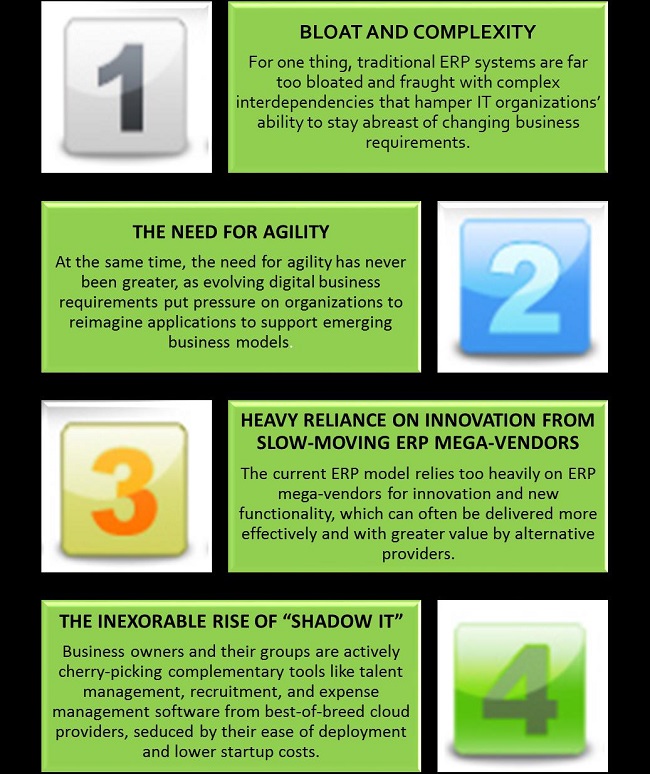
Time to Federate Enterprise Resource Planning
Future businesses will be defined by new efficiencies, strategies, and business models created with data-driven knowledge. If companies wish to maintain traditional on-premises ERP solutions, they will face costs and compromises.
- By William McKnight
- February 7, 2017
In the current generation of business, knowledge is power. The ability to collect, compile, and analyze data to create new business models, efficiencies, and revenue streams will define the successful enterprises of tomorrow. With the advent of big data, the Internet of Things (IoT), machine learning, and augmented reality, the way companies interact with their consumers, products, prospects, regulators, and partners is rapidly evolving.
The successful organizations of the future will be those that embrace relevant emerging technologies most effectively. Future businesses will not be defined by inherent product quality or consumer retention. Instead, data-driven knowledge of product efficiencies and use, supply chain operations, and customer and employee behaviors will drive bottom-line profitability through cross-departmental efficiencies and business-model evolutions.
As more organizations adopt intelligent devices, connected systems, and smart business applications, companies will be presented with a paradox of old and new technologies. Today's critical business systems, including enterprise resource planning (ERP), were not designed for connected technology and the enormous amount of data it provides.
New Technologies Need New Support Systems
"Building a new IoT platform on top of old industrial reporting systems can cause problems because the legacy tools format data in their own way. ... You're not taking the real, elemental data -- you're taking some translation of that," said Harel Kodesh, vice president of GE's Predix software business and CTO of GE Digital.
As technology continues to rapidly evolve, companies must adapt to keep pace. Legacy business applications and ERP solutions must be replaced with new agile components that can be updated and switched with minimal cost.
The advent of IoT-enabled, purpose-built applications increases specific vertical efficiencies but starves organizations of the ability to centralize and laterally capitalize on that data. Legacy business systems and ERP solutions that were not built to integrate these technologies must be upgraded in a manner that centralizes decentralized information.
Additionally, solutions must offer companies intelligent business applications that are cost-effective, interchangeable, and best of breed.

Figure 1: The Problems with Monolithic ERP
(Source: A Strategic Timeline for Next-Generation ERP. 2016, Ebook, Rimini Street)
With the advent of connected technologies and business applications that process and utilize information in real time, monolithic ERP solutions are beginning to hold organizations back. The large on-premises ERP solutions of today are suffering from an inability to keep up with rapid advances in technology.
Companies are already generating more data than they are capable of processing, storing, and analyzing. As this continues to increase, companies that wish to maintain traditional on-premises ERP solutions will be faced with the realities of cost and compromise.
These companies must commit to large IT budgets for the expansion and maintenance of their on-premises servers to support their internal data, solutions, and business applications. They may also need to compromise on the functionality of the data.
In the data-driven business landscape of tomorrow, such challenges with legacy ERP solutions will force companies to re-evaluate their business suites to maintain a competitive position.
About the Author
McKnight Consulting Group is led by William McKnight. He serves as strategist, lead enterprise information architect, and program manager for sites worldwide utilizing the disciplines of data warehousing, master data management, business intelligence, and big data. Many of his clients have gone public with their success stories. McKnight has published hundreds of articles and white papers and given hundreds of international keynotes and public seminars. His teams’ implementations from both IT and consultant positions have won awards for best practices. William is a former IT VP of a Fortune 50 company and a former engineer of DB2 at IBM, and holds an MBA. He is author of the book Information Management: Strategies for Gaining a Competitive Advantage with Data.